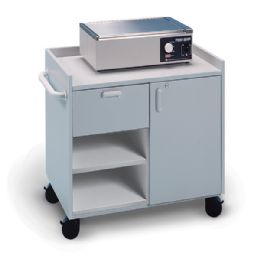







What are Splinting Supplies?
As a requirement of healing from various injuries, strains, sprains and fractures, splints are often used to help immobilize or partially immobilize the injury area. They help to keep patients from reinjuring the area, and help to protect and maintain the injury site. Splints are most often applied for minor fractures, and for any injuries that have incurred a lot of swelling. While splints may be replaced with casts after initial inflammation and swelling has been reduced, splints will not tend to cut off circulation like a cast over a swelling injury can do, which usually makes them a popular first choice with medical personnel.
Splinting supplies are inclusive of all the materials and equipment that a healthcare professional requires to apply a splint to an injury. Heating pans, mobile cabinet-carts, bonding gels, freezing sprays, and a variety of splinting materials like elastomers and thermoplastics are some of the main tools of the splinting trade. Rehabmart is proud to offer a comprehensive selection of superior quality splinting supplies from respected and credentialed medical vendors that include Hausmann Industries, North Coast and Patterson Medical.
Choosing the Best Splinting Material
While all splints are intended to help partially or completely immobilize an injured area of the body so it can heal more quickly, correctly and efficiently, there are many materials to choose from to accomplish this task for every unique injury. Although splints are often used in place of harder, heavier casts, or work like partial casts, they are constructed from lighter, more pliable materials that can be more easily molded to fit the contours of the body, and can even be made to be easily taken off and put back on for hygienic purposes.
Thermoplastics of varying consistencies are the materials most widely utilized for both low and high temperature splinting applications. Specially designed heating pans make sheets or strips of splinting materials soft and malleable, allowing the practitioner to customize each splint wrapping procedure to the individual and the specific injury. Pre-molded configurations may be softened with a heat gun rather than a heating pan to fit the contours to each patient and the particular injury, and tend to work better than prefabricated splints that cannot be changed.
Whether the splint material comes in flat sheet form or a pre-molded form, the resistance offered can vary from minimal to moderate to hard, with customizable patient support. Once heated, the materials tend to stretch easily, drape well, and conform properly to body contours. Some materials are more suitable for patients who require gentler handling, such as babies and the elderly, while others are more appropriate for athletes and sports injuries. Often waterproof, splinting materials are also available in mini- and micro- perforated formats, to allow enhanced airflow and breathability, while others offer increased antimicrobial properties. Many color choices are additionally available.
Another type of splinting material is an elastomer, a kind of soft putty. This splinting substance is easy to mold for a precise (and soft) fit against the skin, and can be utilized alone as a splint, or as a part of another type of splint to ensure a more supportive fit. It works well with sensitive skin, and is often utilized to create finger separators and web space splints for hands and feet. Just like its more conventional splinting counterparts, elastomer splinting material is strong, durable and resilient.
Rehabmart is pleased to offer a wide selection of splinting supplies from such superior quality vendors as Hausmann Industries, North Coast, and Patterson Medical.
Hulet Smith, OT
Rehabmart Co-Founder & CEO
ck